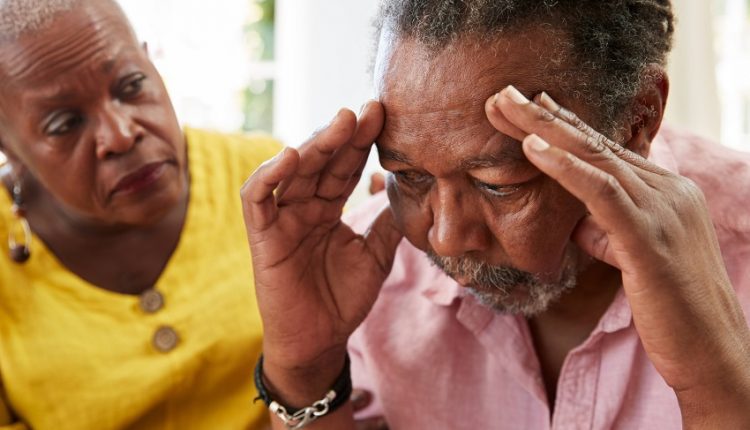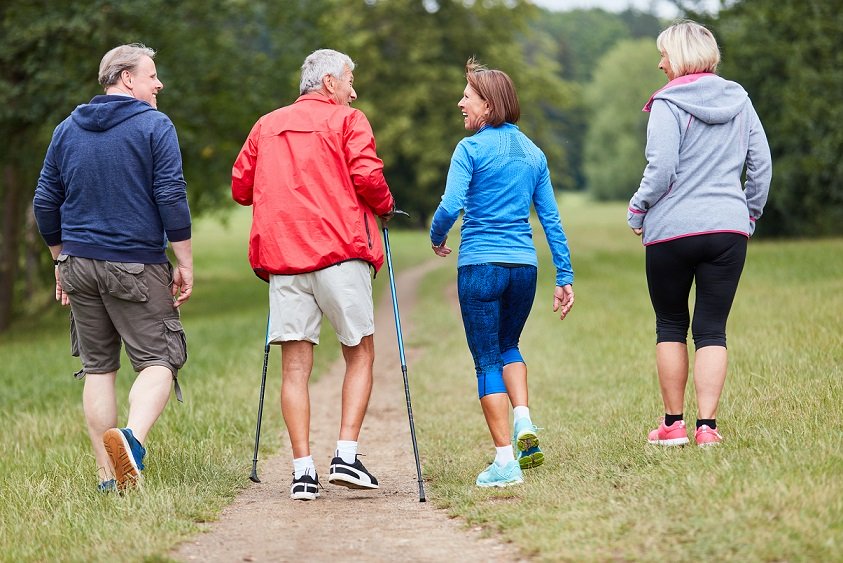
How to Maintain the Mental Health of Seniors
Aging, like every other thing in life, has its developmental issues. But it also comes with wisdom, free time, experience and maturity, and it is an excellent opportunity to pass on the experiences to future generations. Aging brings a gradual decline in our physical abilities, but it is downright wrong to link aging with physical and intellectual disability.
Each cell in our bodies has a life cycle, and various environmental and genetic factors are involved in its life cycle. Aging also changes the structure of the cells.
But seniors can easily maintain their physical and mental abilities during their golden years; there are various ways to sustain mental health during old age. Today’s article on Living Maples will introduce some tips to achieve just that.
Read More: The Common Mental Disorders that Threaten the Elderly
Contents
Tips on Maintaining the Mental Health of Seniors
- Pay attention to depression and anxiety symptoms: Depression and anxiety sometimes coexist with old age. If you have recently felt mood swings, decreased energy, and decreased enjoyment of daily activities, consult a psychiatrist.
- Studying: Research shows that the more the elderly learn and read different books, they will achieve better mental health.

- Enough rest and sleep: Adequate sleep and rest will help you have a calm mind. Get 7-8 hours of sleep a night. Taking a nap during the day for half an hour can adjust bodily functions.
- Avoid stress: Stress can have severe consequences on the mental health of seniors, and it can disrupt bodily functions, the functioning of the nervous system, memory, and concentration. To deal with stress, one must first find the source and deal with it. Activities such as walking, sports, recreational activities, and relaxation (meditation and yoga) or going on vacation for a few days can help reduce stress.
- Protecting and preventing brain injuries: Falling is the most common cause of brain injury in old age. These injuries can lead to a decline in brain capacity, so we must adequately protect the brain as the body’s most valuable organ. The walking path of the elderly and places where there is a possibility of slipping should be fixed, and there should always be enough light in the house to prevent falling. Talk to your doctor if you feel unbalanced while standing or walking.
- Stay connected: Staying connected with family, friends, and community can help seniors maintain a sense of purpose and belonging. Regular phone calls, video chats, or visits can help seniors feel less isolated and reduce the risk of depression.
Motivational Tips on Improving Mental Health of Seniors
- Not giving up the job and willingness to work: Working has a good impact on the mental health of the elderly, and seniors who work part-time or full-time have better mental health.
- Keep in touch: Depression and loneliness are among the issues that most elderly suffer from. However, they are easy to manage if the elderly keep in touch with their loved ones. Studies show that contacting family members, whether in person or via social media and video chatting, can enhance the mood and mental health of the elderly and create a sense of worthiness in them.

- Maintain Social Relationships: Social relationships with friends, family, relatives, and co-workers help maintain mental health. Studies have shown that people who interact well with family members, relatives, and social groups develop Alzheimer’s symptoms later than those isolated and alone, so it is recommended that the elderly maintain these relationships.
- Exercise your mind and brain: Some distractions are considered normal in old age. Stress, anxiety, and busy living can also interfere with your memory and concentration. Engage your mind by solving various crosswords and puzzles, increasing your general knowledge by reading books, and listening to podcasts, which are both one of the best hobbies for seniors.
- Ask for help: Family members and friends are usually available during crises, but in case you are unable to ask for their support, you may ask a professional caregiver to attend and solve your issues and trust in their abilities since they have years of training behind them and are not unfamiliar with such situations.
Exercise and Diet Tips
- Start physical activity today: The sooner you start regular exercise, the more benefits you will gain. Exercise reduces chronic diseases such as atherosclerosis, lowers blood pressure, lowers blood fats, etc. A regular and gentle daily physical activity, such as walking for 30 minutes a day, reduces cardiovascular disease and osteoporosis incidence. This improves your respiratory function, blood flow, and ultimately a general feeling of physical and mental health relaxation. In many cases, diet and exercise, without additional surgical or medical interventions, can stop the process of a disease.

- Enroll in various classes: It is never too late to learn. Learn to work with computers and contact your friends and acquaintances by e-mail. You can also enroll in sports classes. Engagement in various courses can improve seniors’ mental health to a considerable extent. Avoid solid fats, maintain a healthy weight, use all food groups, mostly fresh fruits and vegetables. You also need to use dairy products, and do your best to maintain your health.
Warnings for Mental Health of Seniors
It is quite natural for the elderly to experience physical and mental changes due to their age. But these changes should not restrict them. However, some changes can act as a forewarning for some severe disorders, and timely management is a must. The following are some warning signs that need to be considered:
- Not paying enough attention to appearance
- Unstable weight and appetite changes
- Depression lasting for more than two weeks
- A sense of guilt and considering suicide
- Not being able to remember various events related to short-term memory
- Chronic pains in various parts of the body
- Not being able to calculate and work with numbers
- Fatigue, loss of energy, and sleep disorders
If you are experiencing any of the symptoms mentioned above, it is necessary to visit your doctor’s office as soon as possible.
Final Words
With health and vitality, longer life can be a better life, but it requires certain changes. In this regard, the greatest challenge is not increasing our lifespan but rather increasing the number of years we can be fully active, independent, and happy. Getting enough sleep, exercising, social interaction habits, and disease prevention will help us live longer and healthier during our golden years.
I have to say, as someone who has suffered from depression for years now, I find keeping in touch with people I know the hardest part. Sometimes I don’t even want to call my family. It doesn’t even take much time, but I don’t want to do it. Sometimes. They’re understanding and tell me I don’t need to force myself, but sometimes they take it personally and think I have a problem with them. I can’t find the energy. Talking and finding topics to talk about is just too hard. Does anyone know what I can do to make this easier?
Hi Amy
It makes total sense that you feel this way. Not wanting to socialize is a common effect of depression. If you’ve already explained why you can’t constantly keep in touch with them and they still don’t get it, then it’s on them. You can’t change what others think about you if they don’t try to understand your situation. What you CAN do is make sure you receive the clinical help you need. Depression is not easy to defeat, making it even more important to look for its source, which is best done with the help of a professional.
Hello! thanks for sharing your experience. I think it’s normal if somedays you’re not in the mood to talk, but the point is that it will get worse if you avoid talking to your family. Communication is what makes us alive! So, if it is hard for you to find any topic, talk about your daily activities or the book you’ve read. Talk about your feelings or tell memories of your childhood, and remember you are not expected to talk about something special every day. Sometimes all they need is to hear your voice and make sure that you’re ok. Take it easy!
Thank you for this great article! Old age is the most beautiful age if the elderly can spend quality time with their loved ones. Now that they’ve retired, they feel numb and empty, as if they’ve lost control of their life. Also, due to the demanding work schedules of younger family members, spending meaningful time each day is difficult. So, in my opinion, it’s best to get kids involved in their activities, allowing them to meet like-minded people and helping them to feel connected, confident, and capable of helping the community.
Exactly! My mother was dealing with retirement depression a while ago, and I arranged some parties and gatherings with my siblings every weekend. It helped a lot.
Here are a few things I recommend that has worked for me:
Value yourself, Treat yourself with kindness and respect and avoid self-criticism. If you respect yourself, the world will follow.
Take care of your body, work out, and if that is not an option, you can simply walk and stretch.
Surround yourself with family and friends, if you can.
Reward yourself for your little achievements.
Try to learn how to empty your mind before bed.
Stay away from those who are careless towards their mental health.
We usually become our environment.
Hi! My parents are over age 70. They have tried to stay healthy by gardening. They have a small yard and have planted flowers and evergreen plants. Watering them and moving around them has given them a great deal of happiness and joy. They even drink their afternoon tea near the yard. I would recommend gardening.
Hi there! My mom is almost 63, and I recently noticed the signs of depression in her. I mean, she was never that type of energetic and extrovert person. Still, now she avoids people differently. She stays at home all day and does not even talk to her friends once in a while anymore. I’ve tried to convince her to see a therapist, but she believes that everything’s ok. If anyone has a similar experience pls tell me what I should do about her.
Hi Jess, sorry to hear that. I believe the first step is talking to her very kindly and patiently to see if anything is bothering her. Listen to her attentively; she may try to conceal her problem not to worry you, so ensure verbally and actually that you are strong enough for anything. Second, if possible, try to do some sport or exercise with her, especially the ones she is interested in. You may also invite or take her to her favourite places such as restaurants, museums or anywhere she enjoys being. I hope you find these helpful.
I do anything that stimulates my mind!
I drive down unfamiliar roads, read books in genres that I don’t usually read.
Community is huge for me…And honest communication with similar or dissimilar minds is a must.
My advice to every man and woman my age is to join a book club or volunteer at an institution they care about. Many people like church, but if that’s not your cup of tea, try libraries and keep getting out. That’s the most important part.
And exercise, even if it’s just walking…Isolation can be a problem as we get older.